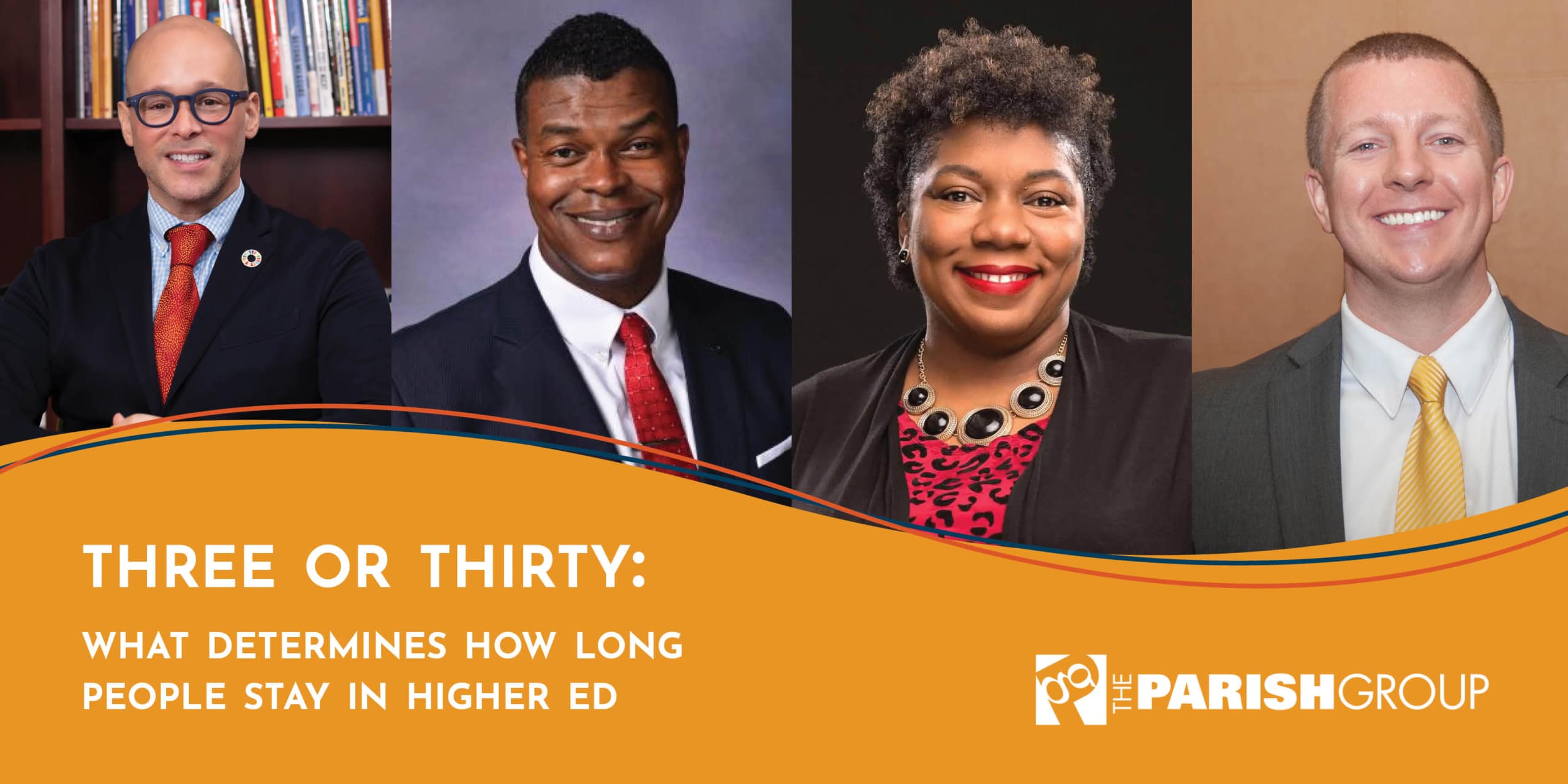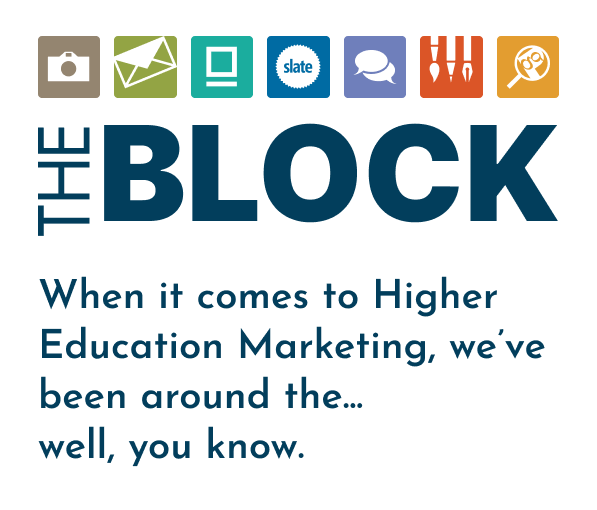
Higher education is no stranger to challenges, and one of its persistent issues is high turnover rates among professionals, particularly in enrollment management.
The term ‘three or thirty’ comes from the idea that positions are often short-term stints of about three years to gain experience before transitioning to another field or a long-term commitment spanning one’s career.
While each institution has unique dynamics, overarching themes influence how long individuals remain in higher education roles.
Factors such as professional growth opportunities, burnout, and the sense of belonging within the workplace significantly impact the ‘three or thirty’ mentality.
Interestingly, these themes parallel an institution’s selling points commonly emphasized to prospective students like success after graduation, support services, and the ability to find community.
We’ve recognized that today’s high school students exhibit significantly different behaviors from previous generations. But what about the younger generations in the work force?
Late 90s Millennials and Gen Z, in particular, show a distinct inclination to question and challenge traditional management structures, career paths, and work-life balance.
It’s not too late for higher education to align internal practices with preached values. As the next wave of admission counselors enter your office, are you prepared to support their growth towards future industry-leading enrollment professionals?
Through this, we aim to explore strategies for cultivating these aspects within our professional environments. To do so, we’ve pulled from the experiences of an array of individuals within the higher education space who echo the common ‘three and thirty’ experiences.
Our featured interviews highlight enrollment managers and higher ed professionals across the U.S. with a range of higher ed experience:
- Anonymous / Riley – Former Assistant Director of Admissions at a public state university (>3 years)
- Hillen Grason Jr. – Dean of Admission at Franklin & Marshall College and President of PACAC (12 years)
- Latoya Floyd – Executive Director of Admissions at Fayetteville State University (20 years)
- Rakin “Rock” Hall – Vice President for Enrollment Management at Ithaca College (25+ years)
- Angel Pérez – Chief Executive Officer at the National Association for College Admission Counseling (30 years)
Professional Development
Early introductions to professional development within higher ed is a pivotal experience that many lack.
Angel Pérez, CEO of NACAC, says “Investing in young professionals by engaging them in the art and science of college admissions helps them better represent the institution with a more robust knowledge base.”
He goes on to highlight that “since many admission professionals fall into this work without extensive or formal training in college admission, access to professional development experiences can be a fulcrum point between admissions as a placeholder job and admissions as a career.”
As with many careers, guidance at an early stage can help combat feelings of imposter syndrome. Knowing your place within a larger system can be daunting without access to professional development and mentorship.
In a whirlwind of early career decisions, LaToya Floyd faced a pivotal question from her supervisor: “What do you want to do?” This drove her to dig into the deeper reasonings behind her career choice.
LaToya wanted to have an impact on students in higher education, just as many of her colleagues and supervisors had on her.
“I want to help people, especially those who look like me, actualize their academic goals by providing them with the roadmap that leads to higher education. For me, creating and demystifying access has always been the goal.”
With unwavering support from her supervisors, LaToya embraced this path, guided by mentorship and fueled by a passion for helping students.
Professional development opportunities look vastly different from institution to institution. Sometimes a conference is not in the cards for newer admission professionals.
Latoya adds, “I really enjoy the work but I also love to create impact in a space where opportunities aren’t equal. Resource dollars are often limited, but I find other ways to make an impact. I can give you tips on how to set up a resume, have a conversation with you, or give you exposure to new things to help you become the best version of yourself.”
LaToya’s experience echoes that of many others. As Pérez shares, “Early training can help them envision their place within the larger ecosystem and understand the knowledge and skills needed to advance in a college admissions career.”
After 25+ years in the profession, Rock Hall, now a Dean at Ithaca College, notes “How you recruit, how you mentor, how you uplift—it evolves. Some leaders like to push their people through, some like to pull their people through. I think the best leaders walk with their people through triumphs and hard times.”
Burnout
Our next interview comes from someone who left the field of higher education after a few years as an Assistant Director of Admissions at a public state university. For their privacy, we’ll call them Riley (a nod to our founders’ Boston Terrier).
When asked about burnout, Riley states “I think many people see the role of an admission counselor as a ‘fun’ job. I wish I could wear a body camera on me for a day (especially during Fall travel) to show how much hard work goes into it.”
The often-daunting Fall travel is a huge adjustment for newcomers to the admission world. “It’s more than getting to eat out and travel—it’s literally THE first step to keeping an institution afloat.”
With motivated and intuitive leaders, however, burnout in this type of role can be mitigated. Two of our career admission professionals spoke with us on the benefits of an intuitive and caring leader.
Rock says that “in management, you’ll get a myriad of different questions and complaints. I think if you view yourself as a leader, you want to be of service. There is nothing too taxing, too small, too big, or too urgent to where I can’t stop what I’m doing to listen.”
Dean of Admissions of Franklin & Marshall College and PACAC President Hillen Grason Jr. adds, “I loved coaching athletes but coaching professionals provides a far different level of reward.”
“I want to make sure that we’re not just getting the most out of people while they’re on our team, but that we’re also giving the most to those people and allowing them to grow as much as possible.”
Admission counselors on the front lines are tasked with conveying the selling points of your institution while they’re probably still learning it all for themselves.
After facing burnout, Riley suggests that “management and supervisors need to provide adequate time for new members to acclimate to the role while also realizing that professional growth helps individuals continue on a path to success.”
Whether they are an alum of your institution or not, learning the ropes of higher ed recruitment takes time and thoughtful conversations with campus stakeholders.
Sense of Belonging
During our time in college, with family and friends, in the workplace, belonging drives many of our decisions.
Pouring time and energy into your people at early stages helps them realize their place in the grander scheme of your team’s work.
Rock says that during his formative years, “it was my conversations with people that ignited something within me. There’s something very human about what we do, and I think that human element is what helps us endure.”
“I’m constantly looking to nurture new talent. Legacy of the profession comes into play at this stage in my career. This upcoming generation is creative; they’re digital natives. How can we foster a better level of mutual respect to help guide them through?”
As the youngest, least experienced person in a room, feeling mutual respect from those above you can help develop a sense of belonging.
When asked about the early years in his career, Hillen shared that “the work in PACAC definitely helped solidify my decision to stay within admissions. It was less the work and more about the growth of my network.”
As mentioned before, the culture of an admissions office often reflects the culture we market to prospective students. “Looking at the correlation between student retention and professional retention, one of the similarities is building a sense of belonging early,” says Hillen.
“I think the ability to explore volunteer work with a regional ACAC and starting to build relationships outside of your immediate office helps develop that sense of belonging. That’s what was happening for me in my early work that helped pull me through the three-year mark.”
Thoughts for the Future
Whether you’re guiding young professionals or navigating your own journey as one, our hope is for this piece to ignite meaningful conversations.
Exploring topics like negating burnout, fostering a sense of belonging, and nurturing professional growth is vital to understand both the field and your own role within it.
Whether you view your current position as a stepping stone or envision a long-term career, the early years are a whirlwind of transformation, uncertainty, and personal growth.
Just as many of us once embarked on the journey to find the right college, we now hold the aspirations of the next college-going generation in our hands—all while simultaneously trying to navigate our own passions in the professional world.
Let these stories inspire you to dig deeper and question what it is you want to do.
Enhancing Your Team with The Parish Group
If your admissions office needs support from a dedicated, customer service oriented partner, The Parish Group is here to help.
Through our credible advising service, we offer counselor training, communication audits, and general advising from one of our enrollment experts with decades of experience in the industry.
Reach out at success@parishgroup.com or call our office at 828.505.3000 for more information.
Special thanks and lots of gratitude for the enrollment and admissions leaders we interviewed for this article!







